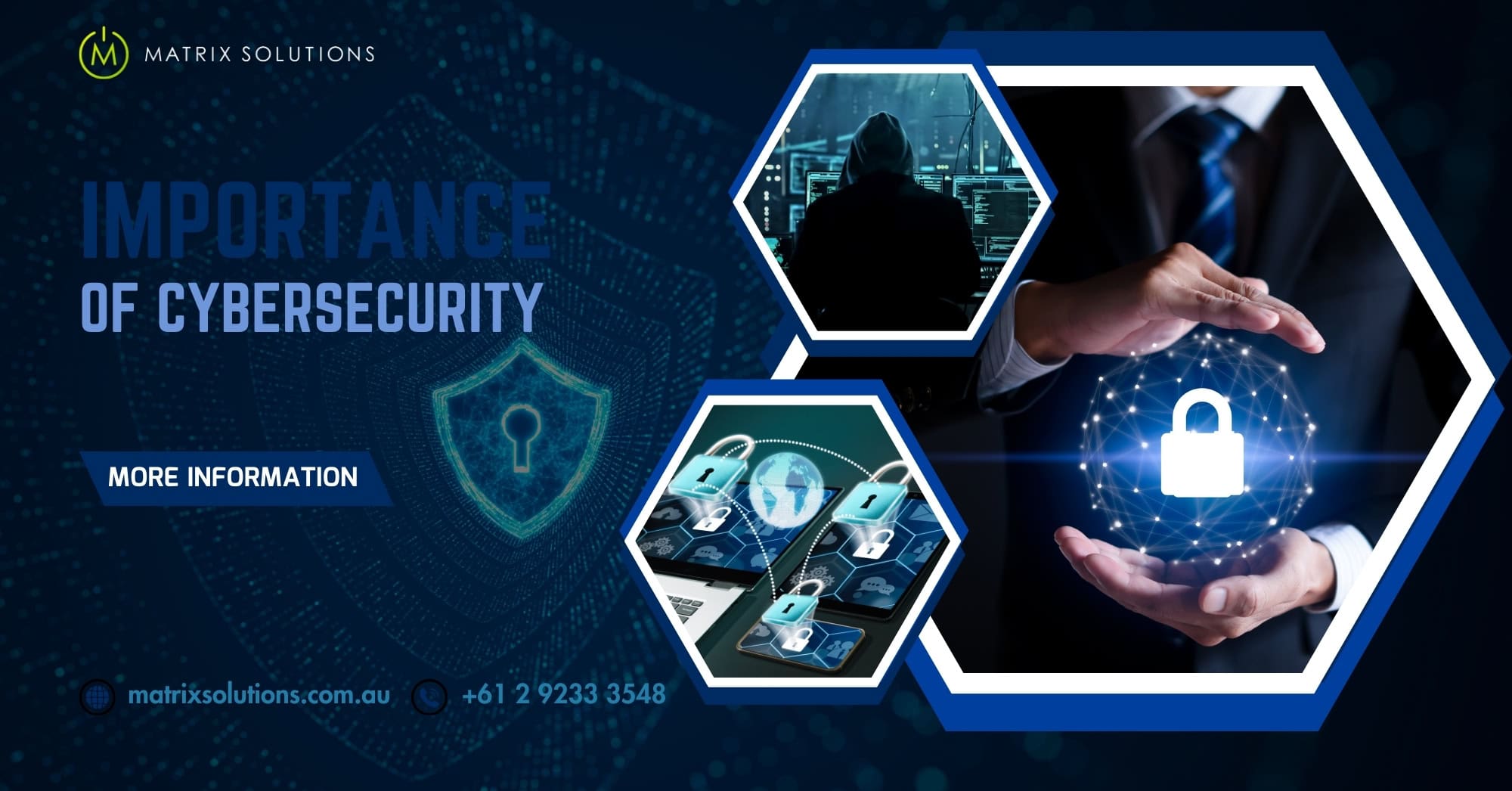Cybercrime is on the rise in Australia, putting businesses, government, and individuals at risk. Data breaches, ransomware, and identity theft are just some of the threats looming in the digital landscape. This is why the importance of cybersecurity in Australia cannot be overstated: robust cybersecurity measures are essential for safeguarding sensitive information, financial assets, and critical infrastructure from these ever-evolving threats.
This blog post explores the country’s key cybersecurity challenges and offers practical advice on protecting your digital assets from the ever-evolving threat landscape.
9 Reasons Why Cybersecurity is Important
In 2023, a staggering 8.2 billion records were breached globally, highlighting the immense scale of the cybersecurity challenge. This alarming statistic underscores the critical importance of cybersecurity for both individuals and organisations. Here are nine key reasons why:
Protection Against Cyber Threats
Cybersecurity acts as a shield against various cyber threats, including malware, ransomware, phishing attacks, and data breaches. These threats can disrupt operations, compromise sensitive information, and cause financial losses. Robust cybersecurity measures help detect, prevent, and mitigate such threats, safeguarding digital assets.
Safeguarding Personal Information
In today’s internet-driven world, our personal information is constantly being collected and stored online. Cybersecurity ensures that this sensitive data, such as financial details, health records, and social security numbers, remains confidential and protected from unauthorised access or misuse.
Business Continuity
Cyberattacks can cripple businesses, leading to downtime, loss of productivity, and reputational damage. Effective cybersecurity measures help ensure business continuity by minimising the impact of cyber incidents and enabling quick recovery.
Regulatory Compliance
Many industries are subject to stringent regulations regarding data protection and privacy. Cybersecurity helps organisations comply with these regulations, avoiding legal penalties and fines.
Trust and Credibility
Customers, partners, and stakeholders trust businesses that prioritise cybersecurity. Demonstrating a strong commitment to protecting data and systems enhances a company’s reputation and fosters trust.
Economic Security
Cyberattacks can have a significant economic impact, ranging from direct financial losses to indirect costs like lost business opportunities and decreased investor confidence. Cybersecurity safeguards economic interests by minimising the risk of financial damage.
Protection of Proprietary Information
Intellectual property, trade secrets, and confidential business information are valuable assets. Cybersecurity protects this proprietary information from theft or unauthorised disclosure, maintaining a competitive edge.
Avoidance of Financial Losses
Cyberattacks can result in direct financial losses through theft, extortion, or the cost of recovery. Cybersecurity investments help mitigate these risks, saving businesses from significant financial burdens.
Enabling Safe Innovation
Innovation often involves the use of new technologies and processes. Cybersecurity provides a secure foundation for innovation by identifying and addressing potential vulnerabilities, allowing businesses to innovate confidently.
Cyber Attacks Impact on Individuals and Businesses in Australia
Cyber attacks pose a significant and growing threat to both individuals and businesses in Australia. For individuals, the impact can be devastating, leading to identity theft, financial loss, and emotional distress. Personal information such as banking details, health records, and even social media accounts can be compromised, leaving victims vulnerable to fraud and scams.
Businesses are also at risk, with cyber-attacks potentially causing significant financial damage, operational disruption, and reputational harm. Small and medium-sized enterprises (SMEs) are particularly vulnerable, as they often lack the resources to invest in robust cybersecurity measures. In addition to direct financial costs, businesses may face regulatory fines, legal action, and loss of customer trust.
The Australian Cyber Security Centre (ACSC) reports that cybercrime significantly threatens Australia’s economic prosperity and national security. In 2022-23, the ACSC received over 76,000 cybercrime reports, an increase of 13% from the previous year. This highlights the urgent need for individuals and businesses to protect themselves from cyber threats proactively.
One effective strategy for enhancing cybersecurity is implementing the Essential Eight Security Controls, developed by the ACSC. These controls include measures such as application whitelisting, patching applications and operating systems, restricting administrative privileges, and enabling multi-factor authentication. By adopting these practices, individuals and businesses can significantly reduce their vulnerability to cyber threats and better protect their sensitive information.
Key Components of Effective Cybersecurity
These are the main components of effective cybersecurity:
Understanding Cybersecurity Fundamentals
The foundation of effective cybersecurity lies in understanding the fundamental concepts and principles. This includes knowledge of common cyber threats, vulnerabilities, and attack vectors. It also involves staying updated on the latest cybersecurity trends, technologies, and best practices. A solid understanding of cybersecurity fundamentals allows individuals and organisations to make informed decisions about security measures and prioritise resources effectively.
Risk Assessment and Management
Identifying and assessing potential cybersecurity risks is a critical step in developing a robust cybersecurity strategy. This involves evaluating the likelihood and potential impact of various threats, such as data breaches, malware infections, or system failures. Once risks are identified, appropriate mitigation strategies can be implemented to reduce the likelihood or impact of those risks.
Proactive Monitoring and Response
Effective cybersecurity is not just about prevention; it also involves proactive monitoring and timely response to security incidents. This requires implementing tools and technologies that can detect anomalies, suspicious activity, and potential threats in real-time. Incident response plans should be in place to quickly contain and mitigate any security breaches, minimising damage and downtime.
Education and Training
Human error remains a significant factor in cybersecurity breaches. Cybersecurity training for employees and users is essential to educate them about potential threats, phishing scams, safe browsing habits, and strong passwords. Training should be ongoing and adapted to the specific roles and responsibilities of individuals within the organisation.
Compliance and Legal Requirements
Organisations may be subject to specific cybersecurity regulations and legal requirements depending on the industry and location. In Australia, key regulations include the Privacy Act 1988, the Notifiable Data Breaches (NDB) Scheme, the Cybersecurity Act 2018, and the Telecommunications and Other Legislation Amendment (Assistance and Access) Act 2018. Compliance with these laws is essential for protecting sensitive data, avoiding legal repercussions, and maintaining customer trust. Staying informed and implementing necessary controls is crucial for compliance.
Lets Look into Cybersecurity Trends and Future Outlook
The cybersecurity landscape is rapidly evolving, demanding constant vigilance and adaptation. Key trends include:
- Rise of Artificial Intelligence: AI and machine learning are revolutionising threat detection and response, enabling proactive analysis and automation.
- Cloud Security Focus: With increasing cloud adoption, robust security measures are crucial for both cloud providers and organisations using cloud services.
- Ransomware Threat: Ransomware attacks are escalating, demanding hefty payments. Organisations must prioritise backup and recovery, and educate employees on identifying and avoiding phishing attempts.
- Zero Trust Adoption: Zero trust, assuming no user or device is inherently trustworthy, gains traction to mitigate insider threats and lateral movement.
- IoT Security Concerns: The rapidly growing Internet of Things (IoT) introduces new vulnerabilities. Businesses and individuals must prioritise IoT security measures.
- Cybersecurity Awareness: Human error remains a significant factor. Regular cybersecurity awareness training for employees is essential to combat phishing, social engineering, and other common threats.
Staying informed about these trends and implementing proactive measures is crucial for individuals and organisations to effectively protect themselves in the ever-evolving digital world.
How to Choose the Right Cybersecurity Solutions
Choosing the right cybersecurity solutions requires a strategic approach tailored to your organisation’s specific needs and risk profile.Start by conducting a thorough risk assessment to identify vulnerabilities and prioritize threats. Research and evaluate different vendors and solutions, comparing features, pricing, and customer reviews. Choose comprehensive protection and ensure user-friendly solutions that integrate seamlessly with your existing infrastructure. Remember, cybersecurity is an ongoing process – stay vigilant and adapt to evolving threats.
For organisations seeking reliable and effective cybersecurity, Matrix Solutions is the right partner, offering tailored solutions to meet your unique needs and ensure robust protection.
Partner with Matrix Solutions for your Cyber Security needs
Cybersecurity threats are on the rise, but you can rest assured with Matrix Solutions. We’re Australia’s leading Managed IT Services Provider, offering exceptional cybersecurity and comprehensive IT solutions to businesses nationwide. Here’s why you can benefit by choosing us:
Peace of Mind: We take care of your cybersecurity needs so you can focus on running your business.
Expertise: Our team of experienced cybersecurity professionals provides 24/7 monitoring and protection.
Customizable Solutions: We tailor our solutions to your specific needs and budget.
Proactive Approach: We stay ahead of evolving threats and implement the latest security measures.
Seamless Integration: Our solutions integrate seamlessly with your existing IT infrastructure.
Nationwide Support: We offer comprehensive support to businesses across Australia.
Matrix Solutions, Australia’s leading Managed IT Services Provider, offers comprehensive solutions to empower your business. We safeguard your sensitive information with robust cybersecurity, optimise your operations with scalable cloud solutions, provide expert IT consulting for strategic planning, and even handle your IT management, freeing up your resources. Partner with Matrix Solutions and experience the peace of mind that comes with exceptional IT security and support.
Schedule your free consultation today!
If you want to know more about cybersecurity, read our blog: What is Cybersecurity? Essential Tips for Online Safety
FAQs on the Importance of Cybersecurity
What are the major cybersecurity threats?
Phishing, malware, ransomware, data breaches, and social engineering are the top cyber threats lurking online. They steal information, infect devices, and manipulate individuals. Strong cybersecurity is essential to protect yourself and your organization from these ever-present dangers.
How can small businesses protect themselves from cyber-attacks?
Small businesses can protect themselves from cyber attacks by implementing essential security measures. Use strong, unique passwords and enable two-factor authentication for added security. Keep software and systems updated with the latest patches. Regularly back up important data and educate employees about cybersecurity best practices to recognise and avoid phishing scams and other threats. Consider investing in affordable cybersecurity solutions tailored for small businesses.
What should I look for in an MSS provider?
When choosing an MSSP, prioritise experience and expertise in your industry, a proven track record with similar clients, uninterrupted availability and responsive support, a comprehensive range of services customised to your needs, and transparent pricing with no hidden costs.
How much does MSS typically cost in Australia?
The cost of MSS in Australia varies depending on factors such as business size, network complexity, and required services. Providers usually offer bespoke pricing to match individual client needs, ensuring businesses only pay for the necessary protection. For a precise assessment and personalised quote aligned with your company’s security requirements and budget, we advise you to consult directly with an MSSP. This ensures you receive the most efficacious and cost-effective solution based on your requirements.
Can MSS adapt to different company sizes and requirements?
MSS adapt to various company sizes and specific requirements. Service providers offer a customisable range of services that scale to match your network complexity, data volume, and existing security expertise. This ensures tailored protection for your specific needs and allows adjustments as your business grows. By choosing MSS, you enhance your cybersecurity posture effectively and efficiently, ensuring optimal protection for your business to thrive securely.
Optimise Your IT Infrastructure!
Discover the Key to Efficiency and Success With Matrix Solutions’ Managed IT Services.







